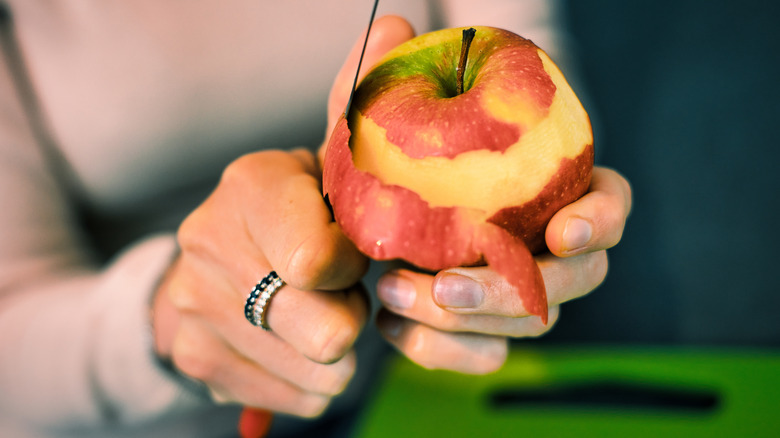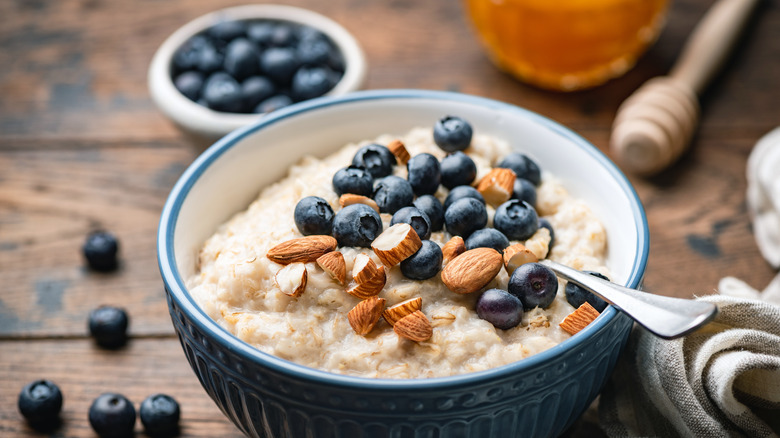Here's Why Women Over 50 Need More Fiber
It's a simple fact of life: as you get older your nutritional needs change. Though you may have eaten the same food for years, the day comes when a beloved favorite just hits you the wrong way. It might be a spicy food that results in instant heartburn or even a seemingly plain food, like cheese or milk, that causes stomach pain.
"There can be both age-related physical changes that happen to the digestive tract, as well as chronic lifestyle factors, like stress or alcohol use, that cause inflammatory damage to the gut," registered dietitian Anna Binder-McAsey tells Eating Well. "All of these factors can cause strain on the GI tract and lead to some weakening or damage that ultimately impacts digestion."
Yet as much as we may avoid certain foods as we age, we also need to incorporate more nutrients for a variety of different reasons (via Aging Care). Most people know that since bones weaken as you age, it's important to make sure you're getting enough calcium. Also, skin loses elasticity so eating foods rich in vitamins E and C, like sunflower seeds, almonds, and spinach helps. However, one often overlooked nutrient is fiber.
Fiber has several health benefits, especially when older
Fiber is a complex carbohydrate that is a vital nutrient for everyone. It helps your body digest food and enables healthy bowel movements (via Healthline). Not getting enough daily fiber can result in sluggish digestion and constipation.
In addition to promoting better digestion, fiber also helps regulate blood sugar levels and improves heart health. Soluble fiber, like apples, pears, beans, and oatmeal, reduces the amount of cholesterol that you absorb (via Mayo Clinic). Regularly consuming this type of fiber actually decreases the amount of low-density lipoprotein (LDL) cholesterol in your blood, which is commonly referred to as the "bad" cholesterol. Eating just 5-10 grams of insoluble fiber daily can help accomplish this.
Though fiber is vital for every age, after 50, your body needs more fiber. Not only does your metabolism slow down as you age, but you tend to weigh more and fiber becomes even more important for keeping body processes optimal.
How to get more fiber in your diet
Women over the age of 50 need 22.4 grams of fiber each day (via WebMD). This can include both soluble fiber (which dissolves in water) and insoluble fiber (which doesn't dissolve).
Unlike other vitamins and nutrients, you can get enough fiber in your diet from the foods you eat so you don't necessarily need to use supplements. Foods high in fiber run the gamut in variety. You can eat berries, sweet potatoes, leafy greens, broccoli, bell peppers, melon, eggplant, beets, squash, whole wheat pasta, chickpeas, and lentils.
By incorporating fiber-filled foods in each meal, you can easily reach the recommended daily values (via Cleveland Clinic). Whole wheat pasta contains 7 grams. One half-cup of cooked lentils contains 8 grams of fiber, as does one cup of berries. Two tablespoons of chia seeds, which can be sprinkled on salads and sandwiches or mixed in yogurt and smoothies, have a whopping 10 grams of fiber.
Fiber is found is many delicious foods so meeting your daily requirement should be an enjoyable experience.


